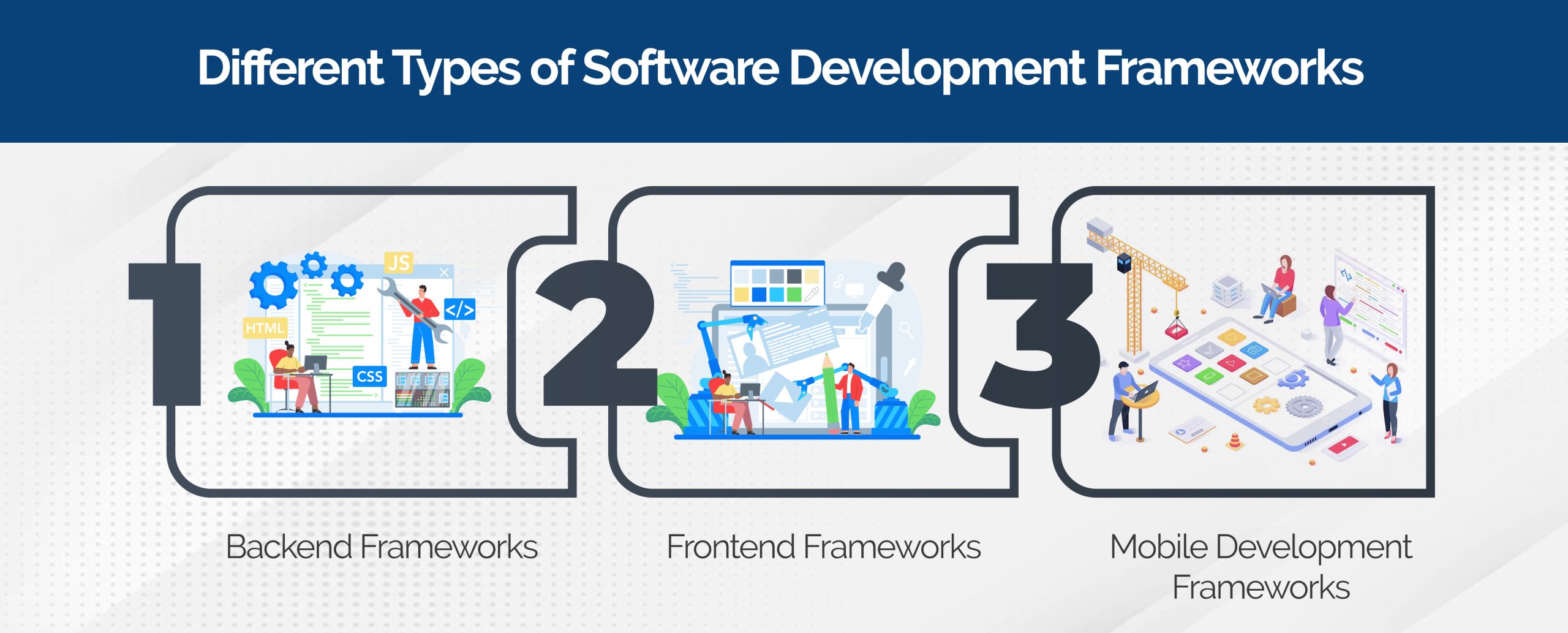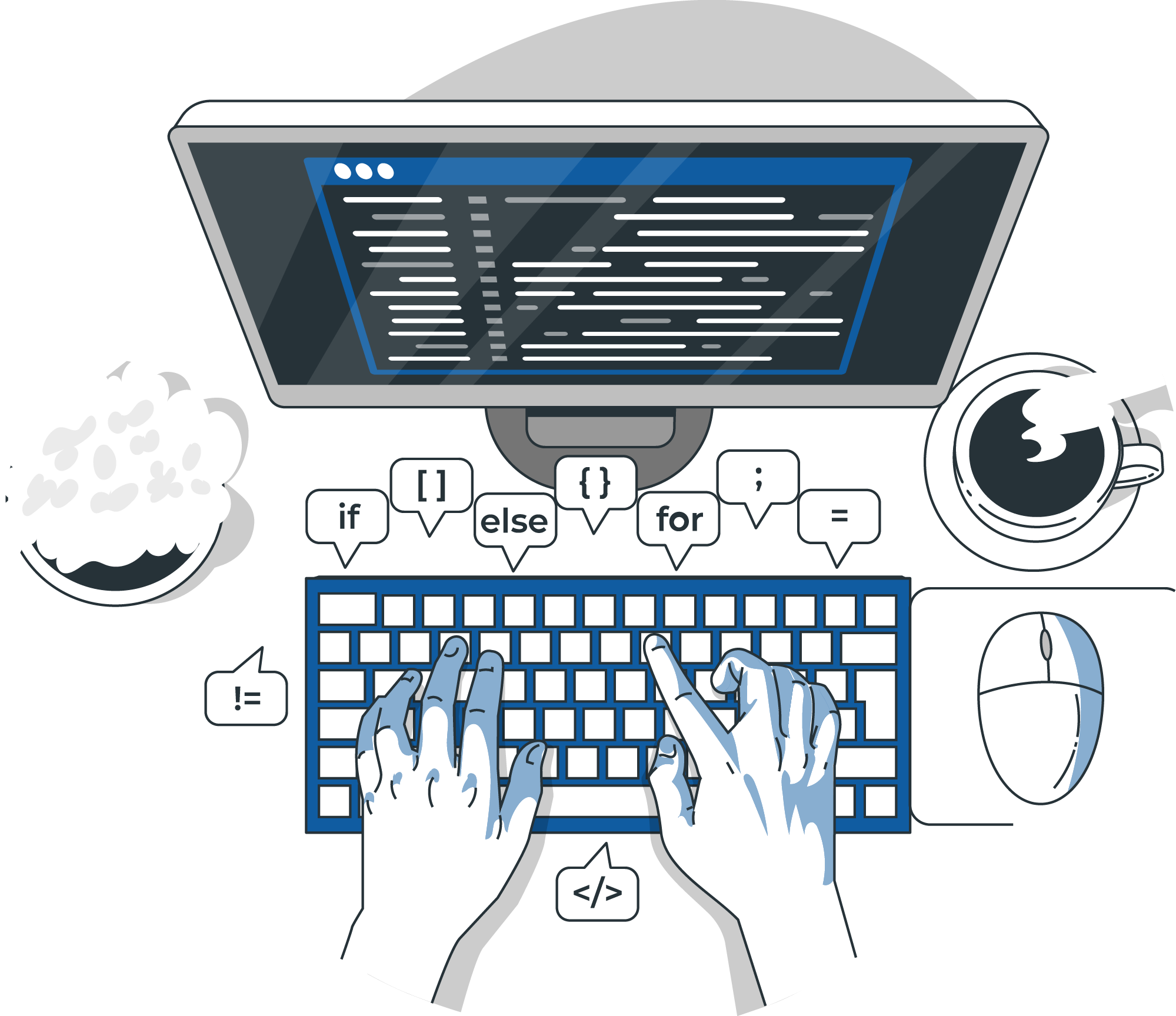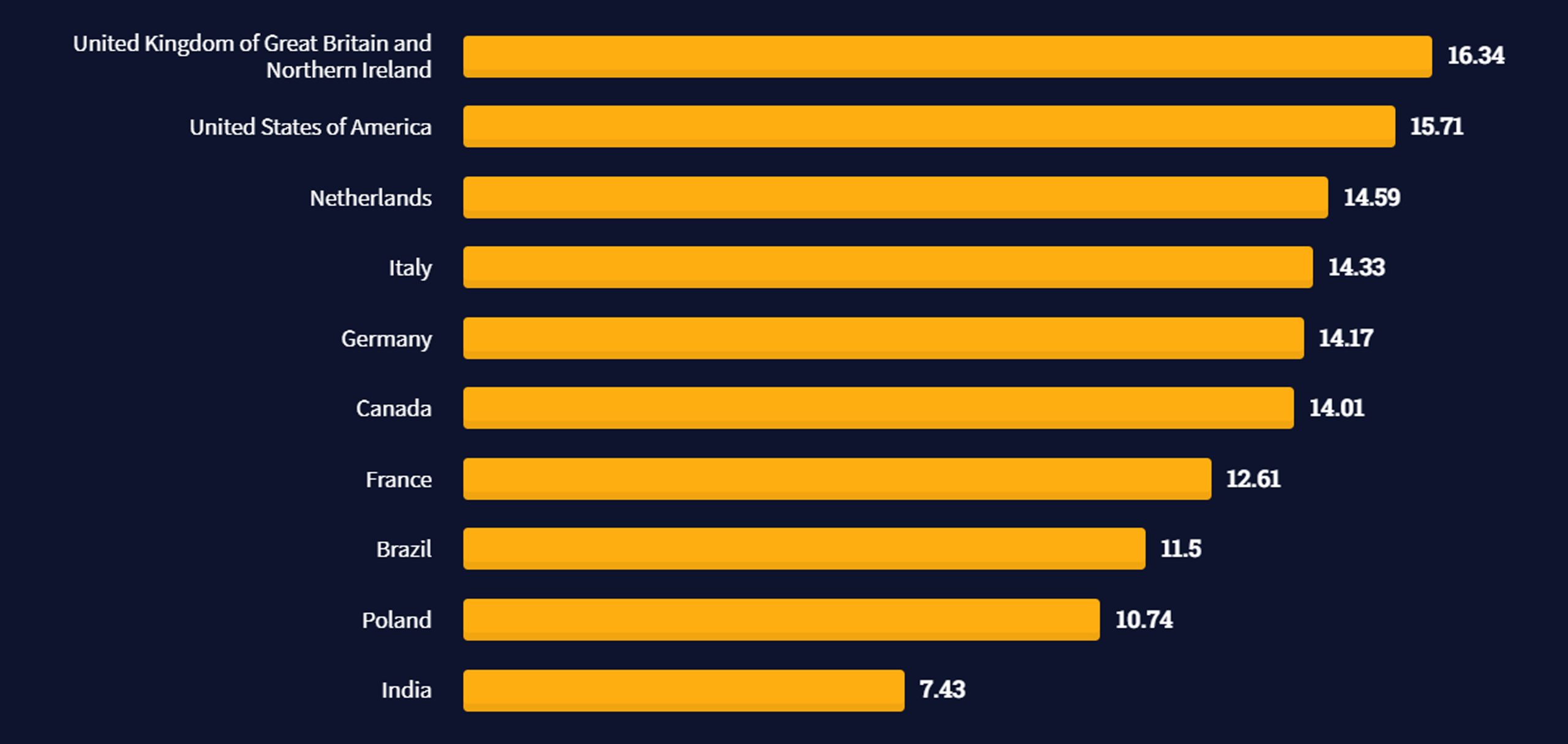The software development industry is among the fastest-evolving globally. Over the years, there has been significant advancement in the field of software development. It has been necessitated by technological advancements, changing user needs, and industry demands.
In this fast-paced and constantly evolving field, developers need software development tools that can help streamline their projects. Data from Stack Overflow shows that the United States and India hold significant positions as global leaders in the population of software developers, with 15.71% and 7.43%, respectively.
As we approach 2024, it’s crucial to anticipate the top frameworks that will shape the software development landscape. What does the future hold for software development and the tech industry?
Let’s discuss.
What Are Software Development Frameworks?
A software development framework is a software model that comprises one or multiple components, such as code libraries and programs, for building software applications. A framework empowers developers to build software applications emphasizing the application’s superior functionality. These frameworks can be viewed as a set of object-based software libraries which enable the reusability of developed software. However, it is crucial to distinguish between a software development framework and a library.
Software frameworks come with predefined elements, such as classes and functions, which handle everyday software tasks, including processing input and interacting with systems. These readily available components enable software developers to build new applications with ease, as they do not have to rewrite code. As a result, this streamlines the development process, making it faster and more efficient.
Components of a software development framework
At its core, software development frameworks are the backbone of software development projects. They provide developers with the necessary tools and libraries to streamline the software development process, making it more efficient, cost-effective, and time-efficient. By adhering to a framework, developers can ensure their code is clean, efficient, and maintainable. A software development framework comprises various components, including libraries, tools, and APIs.
Libraries: Libraries are pre-written pieces of code that developers can use to build software applications faster and with less coding. These libraries can include graphical user interface (GUI) components, networking libraries, or even entire software development stacks.
Tools: Tools are programs that facilitate the software development process. They can include IDEs, code editors, debugging tools, testing suites, and more. These help developers to be more efficient and effective in writing, debugging, and testing software.
APIs: Application Programming Interfaces enable developers to communicate and exchange data with other software applications. They provide developers with the necessary interfaces to integrate different applications into their software projects seamlessly.
Benefits of Using Frameworks
Frameworks have become an essential component of the modern development process. They provide developers with pre-built modules and libraries, and they have revolutionized how software is created and maintained.
Here are some of the advantages of using Software Development Frameworks:
-
Easier development and maintenance
The framework provides developers with a wide set of tools that simplify app development and maintenance, significantly reducing coding time and eliminating the need to write repetitive code.
-
Standardization and compatibility
It can provide a standardized structure for the entire project’s lifecycle, yielding benefits in design, development, and deployment.
-
Consistent code
Utilizing the framework ensures consistent and concise code, eliminating the need for extensive lines of code. This, in turn, automates tasks and decreases the amount of time and effort required.
-
Increased productivity
The framework enables organizations to remain competitive by focusing on strategy, efficiency, and speed, ultimately improving productivity and customer satisfaction.
-
Enhanced security
Using the framework can secure your app against cyber attacks like SQL injection and data tampering.
Different Types of Software Development Frameworks
There are various software development frameworks, each tailored to a specific programming language and specialized function. Now, we shall explore some of the popular software development frameworks for each type of programming language.
-
Backend Frameworks
Server-side frameworks, commonly known as backend web development frameworks, provide fundamental functionalities that can be utilized to support software development. Examples of this rapid development web framework include Django and Rails.
-
Frontend Frameworks
Client-side frameworks, commonly referred to as front-end frameworks, provide a foundational structure of HTML, CSS, and JavaScript components and templates for designing the front end of a website or application. Popular examples of these frameworks include Angular JS, React, and Bootstrap.
-
Mobile Development Frameworks
A mobile development framework provides the best software development tools, debugging aids, and programming interfaces for crafting source code tailored to various mobile devices. Flutter and React Native are two such frameworks.

Popular Software Development Frameworks in 2024
These are the top 10 software development frameworks to consider:
-
NodeJS
NodeJs is a robust framework for software development that runs on the Chrome V8 engine. With an event-driven and asynchronous architecture based on a non-blocking I/O model, it is the ideal choice for data-intensive applications that need real-time output delivery. Since its inception in 2009, NodeJs has become an integral part of numerous corporate software applications. Notable brands like GoDaddy, Netflix, LinkedIn, Walmart, Yahoo, and Groupon rely on NodeJs for their backend development needs.
-
AngularJS
Introduced by Google in 2012, AngularJS is a robust software development framework designed specifically for creating dynamic web pages. It is primarily used for frontend development, making it ideal for developing single-page applications. AngularJS operates on an MVC (Model-View-Controller) framework, ensuring smooth synchronization between the model and view through two-way data binding. Renowned brands such as The Guardian, iStock Photo, NetFlix, Upwork, PayPal, and JetBlue have all successfully implemented the AngularJS framework.
-
Ruby on Rails
Ruby on Rails, also known as RoR or simply Rails, is a server-side web development MVC framework that has profoundly impacted the industry. This innovative framework has features like migrations and seamless database table creation. Due to its object-oriented nature, focus on data safety, and tool integration, Rails is the preferred choice for many developers seeking to create custom platforms, ecommerce stores, SaaS development, and APIs.
-
React
According to a report from Statista, React.js is set to become the leading web framework globally amongst software developers, following Node.js, by 2023.
Technically being a library, React’s abundance of features makes it comparable to a development framework. Its best-in-class features, ease of use, and exceptional performance have solidified its position as the top choice for creating complex applications. Additionally, React’s virtual DOM allows for speedy rendering, making it an optimal option for building dynamic and interactive web interfaces.
-
Django
Django is an agile software development framework ideal for developers focused on delivering quality work within tight deadlines. Based on Python, the framework emphasizes the reusability of components and reduces code repetition, resulting in faster development cycles. One of its main advantages is its advanced security features that come as a default setting. Additionally, Django is highly scalable, which makes it an excellent choice for building web applications of varying complexity.
-
Express Js
Express.js stays at the top of backend frameworks for software development. This versatile framework is ideal for building APIs and web applications, offering an extensive set of separate utilities to simplify development. With its inclusion in popular server-side stacks like MERN, MEAN, and MEVN, Express.js has become an essential component of modern web development. It offers a wide range of functions and capabilities to streamline the creation of robust, scalable web applications.
-
Laravel
Laravel is a PHP framework with an expressive and elegant syntax. Built on top of Symfony, Laravel adheres to the MVC pattern and offers a comprehensive set of tools to help you build robust and scalable applications. By leveraging Laravel’s built-in features such as authentication, caching, sessions, and routing, you can simplify your web development process and focus on delivering great user experiences. Furthermore, Laravel includes integrated support for unit testing, enabling you to ensure that your applications are always up to par.
-
Bootstrap
Bootstrap is a popular frontend web development framework that uses HTML, CSS, and JavaScript. It is highly regarded by its users for being easy to use and having built-in themes and functions. One of its key features is a responsive grid system that ensures web components are displayed uniformly across different web browsers. It also has layout components that can be customized to meet specific requirements. Bootstrap simplifies the development of web pages and adds sophistication to any project with its JavaScript plugins.
-
Vue.js
Vue, a simple yet powerful software development framework, offers a range of capabilities. Its straightforwardness as an MVC frontend framework can be attributed to its progressive nature allows for incremental adoption. Vue’s core library focuses solely on the View layer of the MVC, enabling easy integration with other libraries or projects to enhance its functionality. Primarily used to develop user interfaces, Vue can also be used to create intricate Single-Page Applications when combined with modern tooling and supporting libraries.
-
ASP.NET
If you’re looking for a dependable and high-performance secure software development framework, Microsoft provides two outstanding options, i.e., ASP.NET and ASP.NET Core. ASP.NET enhances .NET’s basic features with code completion, multi-factor authentication, and web-page templating syntax. On the other hand, ASP.NET Core is an open-source alternative that has overhauled the previous Windows-only versions of ASP.NET. Both software development frameworks are appropriate for contemporary web and service development on Windows, Linux, macOS, or Docker.

Selecting the Right Framework for Your Project
The software development world has exploded with numerous frameworks in recent years. Here’s what you should keep in mind when choosing a suitable framework for your project:
- Understand Your Project Requirements
Before you even begin to evaluate web frameworks, it’s essential to understand the unique requirements of your project. Ask yourself what you’re trying to create and what functionalities you need. Once you understand these needs, it’s much easier to find a suitable development framework that best meets them.
- Evaluate Your Team’s Expertise
When selecting a framework, it’s crucial to evaluate the expertise of your development team. Do they possess extensive experience in a specific programming language or framework? The decision should be based on your team’s familiarity and comfort with the chosen program. Opting for a highly advanced framework that demands months of training may not be practical if it exceeds your team’s capabilities.
- Assess Scalability Requirements
When developing an application, it is crucial to consider scalability. It is important to determine whether the application will experience significant growth over time and if the framework is capable of accommodating such growth. It is advisable to opt for a framework that allows for effortless scalability in the future without necessitating major modifications.
- Look at the Framework’s Community Support
Before you commit to a framework, it’s crucial to look at its community support. A strong and active community is an excellent resource for troubleshooting and expanding your knowledge base. Is the framework still in active development? What kind of support do the developers provide to the community? What is the engagement level in the framework’s user community?
Conclusion
Frameworks are and will continue to be crucial players in any software development company. They are popular because of their many features and advantages, making them perfect for building complex and advanced applications.
Our blog explores the world of software development frameworks and examines their benefits, various types, and the top frameworks that are expected to make an impact in 2024. By using these frameworks, developers can simplify their development process, improve the quality of their code, and deliver software applications faster with reduced errors, thus contributing to reducing outsourcing cost.
If you need professional guidance in choosing an optimal framework, do not hesitate to contact our experts at Nethues. Get in touch with us today.








